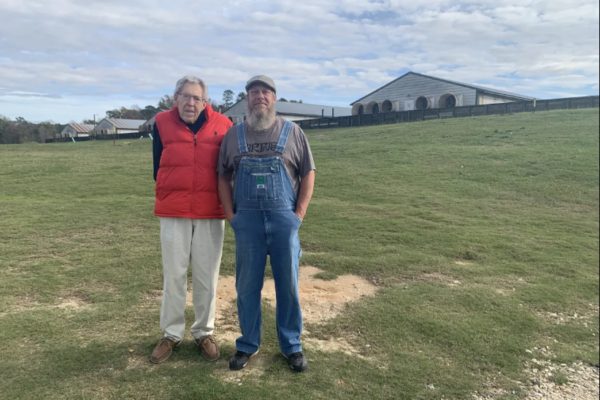By: Lisa Sorg, NC Policy Watch
January 3, 2022
On the first day of 2022, the neighbors’ air conditioners were running. The temperature at Raleigh-Durham International Airport hit 78 degrees, a record for the date; at 1:51 p.m. the high humidity even produced a heat index of 79. A heat index. In January.
This was a redux of December 2021, the third-warmest December at RDU and Fayetteville since records were kept, according to the National Weather Service, and the second-warmest at the Greensboro station.
While not every meteorological blip can be attributed to climate change, the patterns are clear and troubling: The weather is warmer and wilder, and more often destructive.
Late last year, a drought in North Carolina contributed to dozens of wildfires, including a 1,000-acre blaze at Pilot Mountain. The drought drags on: As of Dec. 28, 2021, all 100 counties in the state were in some stage of drought, half of them classified as severe. (Today’s torrential rains will likely change the drought status for several counties; a new report comes out every Wednesday.)
Climate change and its effects will continue to be the most pressing environmental issue of 2022, not just in North Carolina, but also worldwide. How we tackle the existential threat to humanity depends on overcoming political resistance and inertia. The state’s Clean Energy Plan, while ambitious, still falls short. Turning out the lights at night in state buildings, while admirable, fails to hold corporations accountable for their substantial role in the crisis. The plan focuses on reducing and eliminating carbon emissions from coal-fired power plants — laudable — but it doesn’t fully address methane emissions from natural gas and biogas.
In addition to climate change, North Carolina faces several environmental crises: Perfluorinated compounds in drinking water. The proliferation of the mining industry, subject to anemic regulations rivaled only by those governing the poultry sector, which have virtually none. Hazardous waste, air pollution, environmental justice. All of it, and all but ignored by state lawmakers.
That’s where regular North Carolinians come in: Monitoring, reporting, complaining, protecting, advocating for themselves their neighborhoods, their futures.
Here are four major environmental issues to watch in 2022. As the year progresses, the list will certainly grow.
PFAS, GenX, Chemours and the snail-like pace toward regulation
This spring the EPA plans to announce a new — and much more stringent — health advisory goal for GenX, a type of PFAS, or perfluorinated/ poly-alkylfluorinated compound. That’s the good news. Chemours will likely be required to offer alternate water supplies to even more well owners whose drinking water the company contaminated.
The bad news is a health advisory goal is not legally enforceable, and setting one — known as a maximum contaminant threshold — for GenX and two other types of PFAS will take several years. More bad news: There are 5,000-plus types of PFAS, and unless the EPA regulates them as a class, doing so individually will take, well we’ll all be pushing up daisies by the time that happens.
On Dec. 28, the EPA announced it would grant a petition from six environmental groups in southeastern North Carolina, which had asked the agency to require toxicity testing of 54 types of PFAS. The EPA’s announcement, though, was a half-truth. The agency will require Chemours to test only nine PFAS; the toxicity of roughly two-dozen others will be extrapolated from existing studies. Nine additional PFAS could be studied in the future, and 15 did not meet the criteria, the EPA said.
Environmental groups were outraged, noting that the agency’s proposal fell far short of the petition’s requests. Dana Sargent of Cape Fear River Watch posted on Twitter: “As the director of an environmental nonprofit who trusted the folks of this EPA to do the right thing, I am furious. As a poisoned community member grieving the loss of a firefighter brother whose cancer could be explained by this data, I am heartbroken.”
In other Chemours news, ever recalcitrant, the company is taking the NC Department of Environmental Quality to court over a $300,000 fine the agency assessed the company over air pollution. The contested case hearing before an administrative law judge has not been scheduled.
Fuel to the climate change fire: biogas, wood pellets

In the Sampson County town of Turkey, Montauk Renewable Energy plans to haul hog waste from area lagoons (likely in a vacuum truck to avoid potentially slickening Highway 24 with manure from semis) to a former furniture factory on the town’s west side. There tons of waste would be processed through a closed-loop system to turn manure into compost and other beneficial materials — allegedly without producing harmful emissions.
At a public meeting last month, Joe Carroll and Martin Redeker, the latter of whom invented the technology, explained the process, and brought jars of compost and processed hog manure to prove the materials didn’t smell. (It didn’t.) The company has a small test site in Magnolia that turns hog waste energy into electricity that it then sells to the grid; Four County electric co-op has a substation next door. The Turkey site, if it receives all required permits, could still produce biogas, possibly to power the building. At this point, no major pipeline infrastructure is planned.
Turkey residents are concerned about potential odor, flies and traffic, as well as the fact the town would be sandwiched between two hog waste/biogas facilities. A couple of miles east on Highway 24, Align RNG, a partnership between Smithfield Foods and Dominion Energy, will collect biogas from at last count, 15 (as yet mostly unidentified) hog farms outfitted with digesters on their lagoons. The gas from the lagoons will be sent through new pipelines in Sampson and Duplin counties to the Align RNG facility, and from there, injected into a conventional natural gas pipeline.
Opponents of the Align RNG project point out that 1) it still puts the state on track to rely on natural gas infrastructure, and 2) solidifies the outdated system of disposing waste in lagoons. Leftover waste is still held in open pits that stink, and it is still sprayed on fields, which can harm water quality and contaminate drinking water wells.
Enviva’s four wood pellet plants — in predominantly Black and Latinx communities in Hertford, Northampton, Sampson and Richmond counties — continue to burn North Carolina trees to burn for fuel in Europe. Not only does the wood pellet industry contribute to carbon emissions, the timbering for the fuel source removes vital natural flood protection. But Active Energy’s proposed wood pellet plant in Lumberton, in Robeson County, appears to be kaput. In May 2021 the company received a Notice of Violation from DEQ even before the plant operated; its engineers changed the production process without notifying DEQ, a process that would have increased harmful air emissions. Since then, Active Energy temporarily moved to Maine, where its CoalSwitch technology also failed. Shares of the company, traded on the London Stock Exchange, are down 54% since October; investors are griping about promises that have yet to come true. Meanwhile, Lumberton residents, many of them members of the Lumbee tribe, are relieved that their community won’t be burdened with more air pollution.
Mining and mystery drilling

One of the most-anticipated DEQ decisions for 2022 involves a proposed behemoth lithium mine near Cherryville, in Gaston County. At a public hearing in November, hundreds of residents turned out to oppose the 1,500-acre mine, fearing contamination of the groundwater and private drinking water wells.
Piedmont Lithium, the company behind the mine, has contracted with Tesla to provide the essential element for electric car batteries. Unlike vehicles that run on fossil fuels, electric cars don’t emit pollutants from their tailpipes — pollutants that contribute to climate change.
However, extractive industries, like mining, still exact an environmental toll. New technologies could provide companies with less damaging ways to get at the lithium, but miners must learn from their coal and petroleum counterparts, whose practices — mountaintop removal, oil spills — have destroyed neighborhoods and shorelines, harmed public health and decimated ecosystems.
DEQ is expected to announce its decision before spring; Gaston County officials, though, will likely weigh in. And opponents can still delay the permit via the courts.
Residents of Hamptonville, in Yadkin County, could know the outcome of the mystery drilling that’s been happening on 700 acres of farmland since last spring. Residents — 44 of them adjoining the land — are concerned drilling could threaten their drinking water wells. Jack Martin of Synergy Materials has refused to disclose what he’s found or even what he’s looking for, but told Policy Watch and neighbors that once his investigation is complete, possibly this month, he’ll host a public meeting to unveil his plan. Granite? Silica? Lithium? Fracking? The property is owned by former State Rep. Wilma Sherrill, but Synergy has an option to buy it.
Shortly before the holiday break, DEQ announced it had granted a controversial mining permit to Carolina Sunrock for its 426-acre operation in Prospect Hill, in southeastern Caswell County. The mine, in the works since 2019, has divided the county: It was the subject of a zoning referendum, which narrowly failed; figured prominently in the 2020 county elections, resulting in a complaint by Bob Hall, former director of Democracy North Carolina, over allegations of illegal political advertising.
In what appears to be an intimidation tactic, Carolina Sunrock sued 55 people over their objections to the mine and associated asphalt plants in Prospect Hill and the Black community of Anderson Township. Represented by Durham attorney Bill Brian, Carolina Sunrock even subpoenaed private emails from resident Leslie Winner, among those spearheading opposition to the mine.
Residents have not decided whether to challenge the permit before an administrative law judge.
The state Mining Act favors industry — Martin Marietta wrote the law — but it is possible to secure additional environmental protections. Snow Camp residents recently won concessions from DEQ and a different mining company in settlement that grew out of a contested case against the agency. And opponents of the Wake Stone quarry near Umstead State Park also scored a small victory when an administrative law judge ruled DEQ had erred in authorizing a buffer request for a bridge for their mining operation over the sensitive Crabtree Creek.
Critical cleanups: progress or stalemate?

Huntersville is heading into Year 2 of the aftermath of the Colonial Pipeline disaster that spilled at least 1.3 million gallons of gasoline in a residential neighborhood, including the Oehler Nature Preserve. The cleanup is nowhere close to being finished, and will likely take at least a decade.
The spill occurred on Aug. 14, 2020, when a portion of the pipeline failed. The extent of the environmental damage — especially to the groundwater — is still unknown. DEQ has cited Colonial for failing to provide a full accounting of the spill, the largest such onshore accident since at least 1991. Nor is it clear why PFAS was found in runoff at the spill site and in water containing fire suppressant, when that material was advertised as PFAS-free.
In October, DEQ petitioned a Mecklenburg County Superior Court judge to force Colonial to provide this critical information, but the agency has yet to fine Colonial for its deficiencies. This could be the year.

Two years for a cleanup seems short considering remediation of the former Tarheel Army Missile Plant in Burlington is in Year 30. Yes, the East Burlington neighborhood, which is predominantly Black and Latinx, has been waiting 30 years for a solution to the contamination at the 22-acre site.
The U.S. Army, which is responsible for cleaning up the contamination in the groundwater, filed yet another environmental assessment to DEQ last year, but so far that has translated into no action. Meanwhile, groundwater tainted with cancer-causing solvents continues to seep beneath the neighborhood and into a nearby stream that eventually feeds the Haw River.
Aboveground, property owner David Tsui is on the hook for containing and removing contamination in the dozen-plus buildings. DEQ documents show he plans to renovate the few uncontaminated buildings, one for office space and two others for storage. Those upgrades began last fall, but the contaminated buildings that border private homes are not on the renovation list.
The neighborhood desperately needs answers, as well as indoor air testing to ensure hazardous vapors from the solvents have not entered private homes. 30 years is too long to wait; DEQ and the Army must ensure meaningful action occurs before Year 31.
On a more hopeful note, the new federal infrastructure law is funding stalled cleanups beginning this year at 49 Superfund sites, including four in North Carolina. One of those, Policy Watch reported in February 2020, is ABC One-Hour Cleaners near Camp Lejeune.
The former dry cleaners is now in Year 33 of being on the Superfund list, which contains some of the most toxic and intractably polluted areas in the country. But after $1 million in taxpayer money, the cleanup of solvents in the groundwater should be nearly finished. Instead, because of contractual disputes, recalcitrant business owners, broken equipment and even hurricane damage, the cleanup has failed. As a result, the contaminated plume has expanded and threatens Northeast Creek and the New River. The estimated cost of the new cleanup, which includes only soil, not groundwater, is $3.34 million. Once the system is built — about a two-month project — the EPA projects it will take two years to reach clean up goals for the soil.
Three more Superfund projects will also receive funding:
- The 15-acre Hemphill Road TCE site in south Gastonia, went on the Superfund list in 2013 because the business had contaminated private drinking water wells with hazardous solvents. Those households have alternate water supplies now, but the groundwater contamination persists.
- In Yadkinville, the 80-acre Holcomb Creosote site has been on the Superfund list since 2012. The wood-treating business contaminated the soil, sediment, groundwater, surface water and on-site structures.
- Ram Leather Care in Charlotte, another dry cleaning and leather-restoration business, has been on the Superfund list since 2003. Although households were connected to the public water system in 2008, there is a risk that hazardous vapors from contaminated groundwater and soil have entered nearby buildings.






